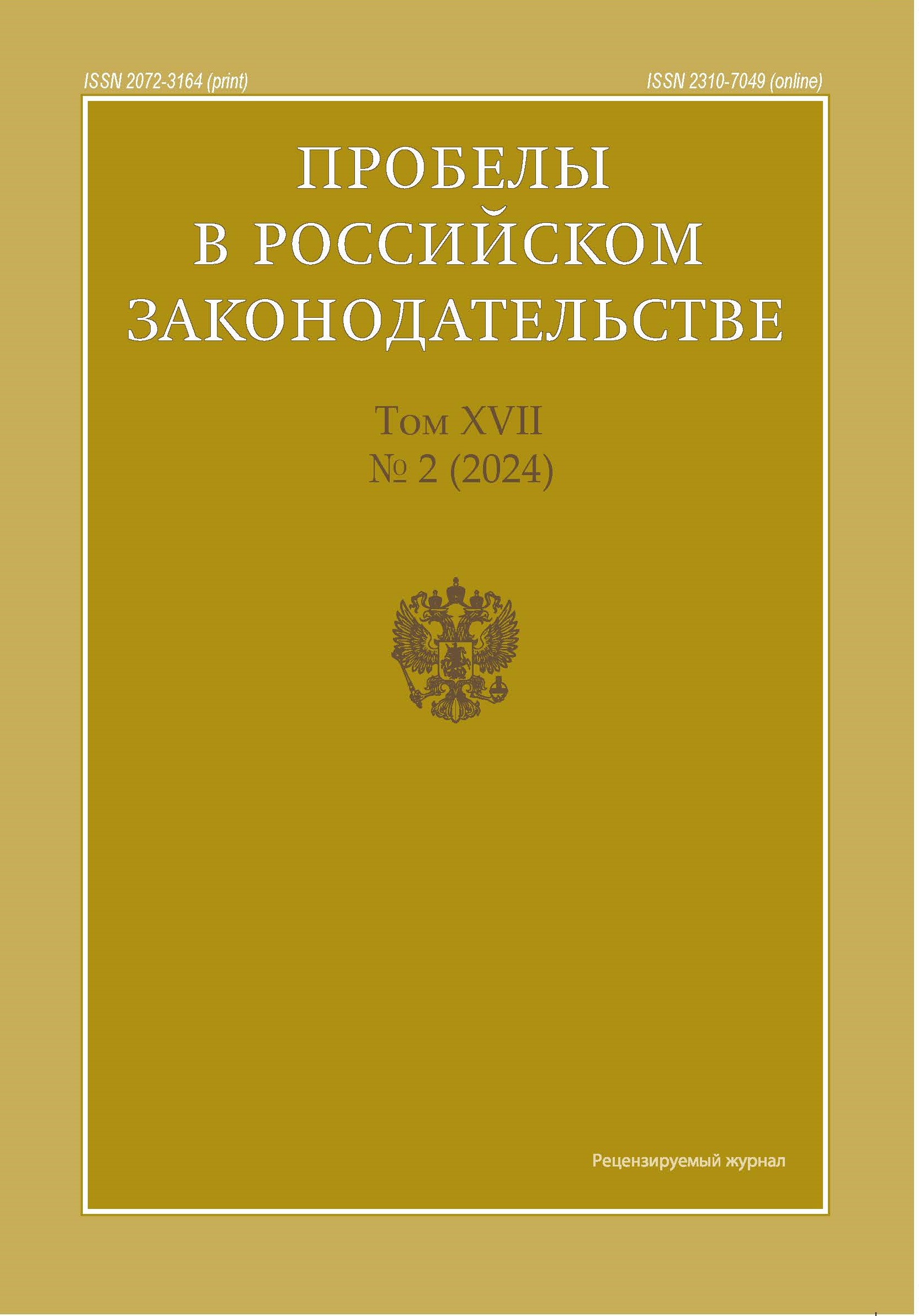Proper Functioning as a Financial and Legal Characteristic of the Operation of Payment Systems
- Autores: Larionova E.S.1
-
Afiliações:
- Lomonosov Moscow State University
- Edição: Volume 17, Nº 2 (2024)
- Páginas: 58-69
- Seção: Public Law (State Law) Sciences
- URL: https://journals.eco-vector.com/2072-3164/article/view/630990
- EDN: https://elibrary.ru/MANNMD
- ID: 630990
Citar
Resumo
The article discusses financial and legal approaches to the regulation of payment systems in order to ensure their proper functioning. The purpose of writing this article is to establish the content of the concept of “proper functioning of payment systems” and to identify financial and legal ways to achieve this characteristic in the operation of the payment system. To achieve this goal, the author analyzed the provisions of not only Russian legislation on payment systems, but also the legislation of the EAEUnion countries in order to identify the legal characteristics established in relation to the operation of payment systems. The conclusions obtained during the study allow us to assert that the characteristics of the operation of payment systems provided for by law, in particular: efficiency, reliability, stability and continuity, can be combined into a general assessment characteristic “proper functioning of payment systems”, reflecting the objective legal expectations of the state and consumers money transfer services regarding the quality of the payment system and the services it provides. The author has formulated legal characteristics, the achievement of which indicates the proper functioning of payment systems, and also proposed financial and legal methods for their implementation.
Texto integral
Sobre autores
Elizaveta Larionova
Lomonosov Moscow State University
Autor responsável pela correspondência
Email: betsalina@yandex.ru
Código SPIN: 5380-9938
Scopus Author ID: 1069957
postgraduate student of the Higher School of State Audit (faculty)
Rússia, MoscowBibliografia
- Burger P., Hawkesworth I. How to achieve value for money: Comparing PPP and traditional infrastructure public procurement // OECD Journal on Budgeting. 2011. No. 1. Р. 91 – 146.
- Fermo B. Laura, Silva A. Raquel. An Assessment of the Transparency and Communication Practices in the Monetary Policy of the Bangko Sentral ng Pilipinas // Bangko Sentral NG Pilipinas Economic Newsletter. 2011. No. 11-05. P. 1 – 5.
- Giraldo Mora, Juan & Avital, Michel & Hedman, Jonas. Development Dynamics of Digital Infrastructure and Organization: The Case of Global Payments Innovation // Fortieth International Conference on Information Systems, Munich 2019. P. 1 – 17.
- Lukoševičienė, Vaiva & Guogis, Arvydas. (2023). The eloge program as access to the self-evaluation of local authorities according to the Twelve principles of good governance of the Council of Europe: the case of Lithuania // Tiltai. 2023. No. 91. P. 105-121.
- Alyakin D.S. Proper execution of contractual obligations in the context of amendments to the Civil Code of the Russian Federation // Law and Management. XXI Century. 2022. Volume 18. No. 3. Р. 39 – 47.
- Bezik K.S. Exceptions to the principle of inadmissibility of unilateral refusal to fulfill an obligation // Siberian Legal Bulletin. 2010. No. 2. P. 62 – 67.
- Efimova L.G. Agreement on the issuance and use of a bank card and an acquiring agreement in the system of agreements on the organization of non-cash payments: monograph. – M.: Prospekt, 2017. 232 p.
- Karpova I.V., Karpov K.A. Financial and legal regulation of money transfers of foreign citizens (remittances) // Current problems of Russian law. 2018. No. 8. P. 78 – 84.
- Krasyukov A.V. Fulfillment of tax obligations: limits of exercise of subjective rights and criteria for proper execution // Vestnik VSU. Series: Law. 2019. No. 4. P. 200 – 211.
- Larionov A.V., Larionova E.S. Completion of settlements in central bank money as a tool for ensuring the uninterrupted functioning of the payment system // Banking. 2021. No. 11. P. 53 – 61.
- Larionov A.V., Salina E.S. Regulation and risk assessment of payment systems // Management Sciences. 2019. No. 3. P. 40 – 55.
- Revinova S.Yu. Some aspects of migrant remittances // Bulletin of the Russian Peoples' Friendship University. Series: Economics. 2013. No. 3. P. 38 – 47.
- Salina E.S. Prospects for the development of the legal mechanism for the functioning of payment systems // Gaps in Russian legislation. Legal journal. 2020. No. 3. P. 79 – 84.
- Senotrusova E.M. On the concept and relationship between the principles of proper and actual execution of civil obligations // Bulletin of Kemerovo State University. Series: Humanities and social sciences. 2022. Volume 6. No. 2 (22). Р. 154 – 162.
- Solyannikova S.P. Appropriate budget policy for a changing economy // World of New Economics. 2021. Volume 15. No. 2. Р. 6 – 15.
- Tamarov P.A. Payment systems from the perspective of Russian legislation and international practice: monograph. - M.: “KNORUS”, 2015. 280 p.
- Explanatory dictionary of Efremova T.F. Efremova. 2000.
- Ozhegov’s explanatory dictionary. S.I. Ozhegov, N.Yu. Shvedova. 1992.
- Chernega V.N. The role of the Council of Europe in the formation of a pan-European space of democracy and human rights // Current problems of Europe. 2015. No. 3. P. 45 – 68.
- Yadrikhinsky S.A. Proper fulfillment of tax obligations as a legitimate interest of the taxpayer // Bulletin of Omsk University. Series "Law". 2020. Vol. 17. No. 3. Р. 36 – 46.
Arquivos suplementares









